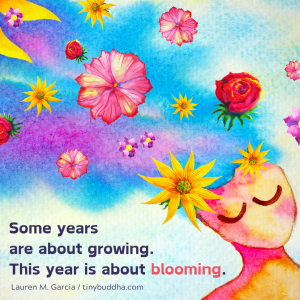
“Our strength grows out of our weaknesses.” ~Ralph Waldo Emerson
In my youth, I strived to be “nice.” I tolerated a lot from others. I forgave easily and learned to “turn the other cheek.”
I made myself constantly available to other people and asked nothing in return. I remained loyal even if people mistreated me. I helped friends even when my need for help was greater. When friends started calling me their “angel,” I was proud at first.
But soon I became resentful of what that implied.
If my purpose was solely to help them, then who would help me?
I felt more like a doormat than an angel.
In my twenties, the proverbial pendulum swung the other way. I became protective of my emotional resources and was rather “prickly” at times.
The self-absorption that is typical of adolescence hit me a little later, as a reaction to feeling taken advantage of in previous years. I no longer wanted to be a helper because I no longer wanted to feel used.
This former strength of mine—helping—now felt like a weakness.
So for a time, I gave up something I truly valued, because I didn’t know how to use that strength without hurting myself.
But after a while, I began to feel a disconnect. It was still important to me to help people— friends, family, and strangers alike. But how could I do it in a way that wouldn’t lead to my downfall?
When a character strength becomes a weakness, how do we maintain what is important to us without harmful side effects?
If we really examine what’s meaningful to us, we often find there are values underlying our character traits that can guide us.
On the stage of life, values are the play directors and character traits are the performers. You don’t use the same performer for every role, so the director has to use the best performer for each role to drive the point home.
“Accommodating” will not likely be cast when the role calls for “advocating.”
Luckily, we each have a whole cast of character traits backstage.
But how do you know which trait fits the bill?
Here are some steps to take when you feel like your strengths no longer serve you:
1. Think of a character strength that has also become a weakness for you.
In my case it’s “helping.” Helping had center stage for a while, but was getting boo’ed off.
2. Now consider this: What are the values that underlie that trait? Why do you have that trait?
In my example of “helping,” the underlying values are community, equity, and compassion, to name a few.
3. Think about the ways in which this trait has not served you, and how does that violate the underlying values?
In other words, when this trait causes more harm than good, how does the harm go against what’s really important to you?
In my case, helping became something I did to the detriment of my own emotional health, sometimes allowing others to take advantage of me. That certainly violates my values of community, equity, and compassion (toward myself).
When “helping” no longer suited the role, it was time to choose another player.
4. As you move about your world, focus on the “why” of your traits—the underlying values.
When you begin to notice that these traits aren’t serving you, shift gears to maintain your values. To do this, you may fall back on another strength.
For example, in my case, when I feel like my helping is breaking the flow of community, becoming inequitable, or lacking in compassion toward myself, I rein it in and use a different character strength (perhaps assertive communication or intentional self-care) that best fits the role.
This technique can work with all of your strengths: loyalty, trust, enthusiasm, flexibility.
When they are not serving you, it may be time to bring another strength into the spotlight, so as not to sabotage your intentions.
5. Once you feel comfortable with that, consider this: Your “weaknesses” may be hidden strengths, waiting in the wings for their turn in the spotlight.
Take some time to think about the “why”s behind them. What values do they express? What purpose do they serve? What role could they play?
Your conflict avoidance may reflect your value of “peace,” but may leave you feeling emotionally stuck.
Your procrastination may reflect your value of “spontaneity,” but may leave you feeling ineffective.
How might you use these traits to serve you? Or how might the underlying value be better expressed? Perhaps the director wants to pull “conflict avoidance” from the stage and put “meditation” out there instead.
It is possible to use all of our traits as strengths, if we are mindful of them and purposeful in their use.
I didn’t abandon my trait of “helping.” In fact, as a psychotherapist and health coach, I made a career out of it. But it remains a strength because I use it only to the extent that it promotes my personal values.
When you feel like the play is falling apart, let the directors re-think the cast, and draw on the ample strengths backstage.
Break a leg!
Photo by Paco Photo
About Angela Marchesani
Angela Marchesani is a psychotherapist and Holistic Health Coach practicing in Wayne, Pennslyvania. Visit her at angeladora.org.













 Though I run this site, it is not mine. It's ours. It's not about me. It's about us. Your stories and your wisdom are just as meaningful as mine.
Though I run this site, it is not mine. It's ours. It's not about me. It's about us. Your stories and your wisdom are just as meaningful as mine. 